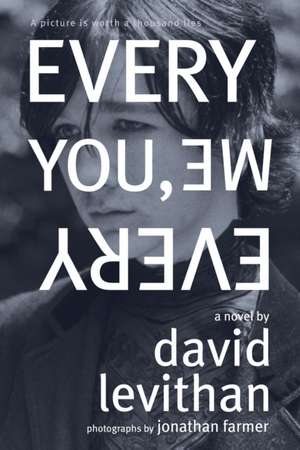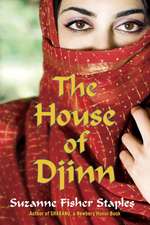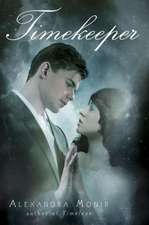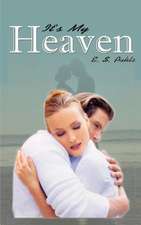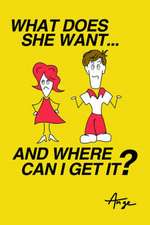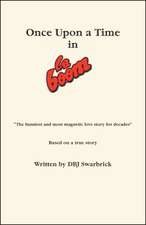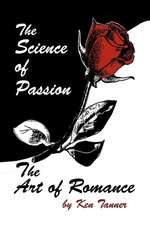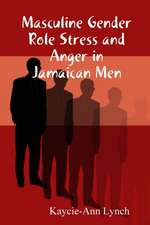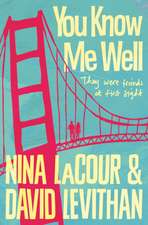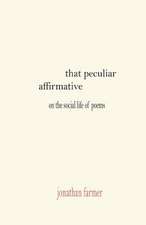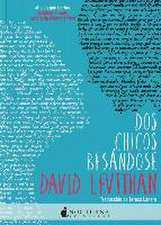Every You, Every Me
Autor David Levithan, Jonathan Farmeren Limba Engleză Paperback – 20 sep 2012 – vârsta de la 12 ani
Preț: 76.72 lei
Nou
Puncte Express: 115
Preț estimativ în valută:
14.68€ • 15.27$ • 12.29£
14.68€ • 15.27$ • 12.29£
Carte disponibilă
Livrare economică 22 februarie-08 martie
Preluare comenzi: 021 569.72.76
Specificații
ISBN-13: 9780375854514
ISBN-10: 0375854517
Pagini: 248
Ilustrații: black & white illustrations
Dimensiuni: 137 x 206 x 15 mm
Greutate: 0.23 kg
Editura: Ember
ISBN-10: 0375854517
Pagini: 248
Ilustrații: black & white illustrations
Dimensiuni: 137 x 206 x 15 mm
Greutate: 0.23 kg
Editura: Ember
Notă biografică
DAVID LEVITHAN is a children's book editor in New York City.
Extras
1
It was your birthday. The first one after you [left vanished] were gone.
When I woke up, I [dreamed] thought about other birthdays. Ones where we'd been together.
Like two years ago. Freshman year. [When I had you all to myself.] I asked you what you wanted and you said roses, and then you said, "But not the flowers." So I spent weeks gathering presents: a polished piece of rose quartz, White Rose tea, a ceramic tile I'd bought at the White House in fourth grade featuring the Rose Garden. A novel called Rose Sees Red, a biography of Gypsy Rose Lee, a mix of songs by bands called Blue Roses, the Stone Roses, White Rose Movement. Then I rigged your locker with pulleys, so when you opened it, all the objects rose. I'm not sure you got that part, not until I told you. But you were so happy then. [This was before happiness became so complicated. This was when you could ask me for something, I could give it to you, and the world would be right.]
And then there was last year. [You went out with Jack at night, but I at least had you for the afternoon.] I asked you what you wanted and you said you didn't want anything. And I told you I wasn't planning on giving you anything; I was planning on giving you something. That whole week, we started to divide things into those two categories: anything or something. A piece of jewelry bought at a department store: anything. A piece of jewelry made by hand: something. A dollar: anything. A sand dollar: something. A gift certificate: anything. An IOU for two hours of starwatching: something. A drunk kiss at a party: anything. A sober kiss alone in a park: something. We ended up spending the afternoon walking around, pointing at things and labeling them anything or something. [Should I have paid closer attention? Written them down? No, it was a good day. Wasn't it?] At the end, you pointed to me and said something. And I pointed back and said something. [I held on to that.]
Now it was a year later. I wished you a happy birthday. [That word again. Happy. It's a curse. The pursuit of happiness makes us deeply unhappy. It's a trap.]
Before anything else happened, there was me in bed, thinking of [who] you [used to be].
I don't want you to think I forgot.
1A
I see too many things at once. I notice shadows. Think about them. And while I do that, I miss other things. Important things. I can't stop looking, even when I [want to] have to stop. I get lost in ifs. They are always there [if if if if] and I should only be able to tune in to them if I'm on the right frequency. But that's the thing about me: The frequencies don't divide.
[That day was your birthday in my head, but it wasn't really your birthday anywhere else.] I wanted to tell people at school that it was your birthday [but I didn't want to get their reaction when I brought it up]. I started to think it was like a surprise party, only they weren't telling either of us. They were going to surprise both of us. [I didn't have this thought for long. It was really just there for a moment.] I pretended like it was a normal day [without you there]. And like all other normal days, I made it through to the other end. [It can be done, you see.]
There are things you decide [and there are decisions you don't even know you are making]. That afternoon, I decided to cut through the woods on my way home. [As I headed that way, I looked at the ground, not the branches or the sky. If I'd stopped to talk to someone after school instead of heading straight home--if I'd had someone to talk to--maybe someone else would have gotten there first. I didn't decide to see the envelope.] I saw the envelope sitting there on the ground. [I should have left it alone. I should have been left alone. I was alone.] I stopped and picked it up. From the weight, I knew there was something inside. I decided to open it.
[I wasn't thinking of you.]
It was so small. I had to focus. I couldn't focus without telling myself to focus. [The eyes take in the colors and the shapes. The images go to the brain for translation.] First I saw the trees, then the sky. It didn't look familiar. [The brain cross-checks the translation against the memories it's stored.] I fixed on the four bare trees, standing like orphaned table legs. I knew those trees--I looked away from the photo and there they were in real life, no more than twenty feet away from me. I walked over to the nearest tree, but that didn't tell me anything. I looked at the envelope, but it was completely blank. [No address, no name on the front. I looked.] I almost put it back. But the sky was getting gray, almost as gray as the sky in the photo. Leaving it on the ground didn't seem right. It was going to rain.
I saw the other trees. I held the photo up against real life, figured out my place in it. But there was something I was missing. [Or maybe there was something extra. I was here. I was not in the photograph. Therefore the photograph was then, and I was now.]
I turned around and saw my school. Its windows. Watching me.
Revealing nothing.
[Anything? Something?]
I put the photograph back in the envelope. [I didn't put the envelope back on the ground.] I kept it. And I might have forgotten about it. I might have just thrown it out, or let it stay in my backpack until it became crumpled and torn and wrecked on the bottom with all the pieces of unchewed gum slipped loose from their wrappers. I might have just shown it to Jack or someone else the next day at school. [In another time, I would have shown it to you first.] We would have shrugged and moved on to the next thing. It would have been a short, short story.
Random, we would have said.
Random.
Meaning:
Completely without a pattern.
or
Completely without a recognizable pattern.
[Meaning:
Either the event is outside any pattern.
or
We are unable to comprehend the pattern.]
I folded the envelope in half, careful that the photo wasn't caught in the crease.
(I try to be a careful person. Most of the time my carelessness is completely unintentional.)
I looked around one more time, stood in the center of the bare trees, at the exact center.
Then I headed home and I lost focus and the barrage in my head started again.
[You will never be happy again. Why do you even think about it?]
Five minutes after I picked up the photo, it rained.
[This pain is all that you have.]
I think:
If I'd been five minutes later, it would have been raining if it had been five minutes later, I would have been dashing through the rain, not noticing if I'd been five minutes later, the envelope and the photo would have been soaked, ruined.
I think:
If I'd been five minutes later, none of this would have happened.
I know:
It probably would have happened anyway. Just not like this.
1B
I woke up at two in the morning, feeling guilty that I hadn't asked you what you wanted this year.
From the Hardcover edition.
It was your birthday. The first one after you [left vanished] were gone.
When I woke up, I [dreamed] thought about other birthdays. Ones where we'd been together.
Like two years ago. Freshman year. [When I had you all to myself.] I asked you what you wanted and you said roses, and then you said, "But not the flowers." So I spent weeks gathering presents: a polished piece of rose quartz, White Rose tea, a ceramic tile I'd bought at the White House in fourth grade featuring the Rose Garden. A novel called Rose Sees Red, a biography of Gypsy Rose Lee, a mix of songs by bands called Blue Roses, the Stone Roses, White Rose Movement. Then I rigged your locker with pulleys, so when you opened it, all the objects rose. I'm not sure you got that part, not until I told you. But you were so happy then. [This was before happiness became so complicated. This was when you could ask me for something, I could give it to you, and the world would be right.]
And then there was last year. [You went out with Jack at night, but I at least had you for the afternoon.] I asked you what you wanted and you said you didn't want anything. And I told you I wasn't planning on giving you anything; I was planning on giving you something. That whole week, we started to divide things into those two categories: anything or something. A piece of jewelry bought at a department store: anything. A piece of jewelry made by hand: something. A dollar: anything. A sand dollar: something. A gift certificate: anything. An IOU for two hours of starwatching: something. A drunk kiss at a party: anything. A sober kiss alone in a park: something. We ended up spending the afternoon walking around, pointing at things and labeling them anything or something. [Should I have paid closer attention? Written them down? No, it was a good day. Wasn't it?] At the end, you pointed to me and said something. And I pointed back and said something. [I held on to that.]
Now it was a year later. I wished you a happy birthday. [That word again. Happy. It's a curse. The pursuit of happiness makes us deeply unhappy. It's a trap.]
Before anything else happened, there was me in bed, thinking of [who] you [used to be].
I don't want you to think I forgot.
1A
I see too many things at once. I notice shadows. Think about them. And while I do that, I miss other things. Important things. I can't stop looking, even when I [want to] have to stop. I get lost in ifs. They are always there [if if if if] and I should only be able to tune in to them if I'm on the right frequency. But that's the thing about me: The frequencies don't divide.
[That day was your birthday in my head, but it wasn't really your birthday anywhere else.] I wanted to tell people at school that it was your birthday [but I didn't want to get their reaction when I brought it up]. I started to think it was like a surprise party, only they weren't telling either of us. They were going to surprise both of us. [I didn't have this thought for long. It was really just there for a moment.] I pretended like it was a normal day [without you there]. And like all other normal days, I made it through to the other end. [It can be done, you see.]
There are things you decide [and there are decisions you don't even know you are making]. That afternoon, I decided to cut through the woods on my way home. [As I headed that way, I looked at the ground, not the branches or the sky. If I'd stopped to talk to someone after school instead of heading straight home--if I'd had someone to talk to--maybe someone else would have gotten there first. I didn't decide to see the envelope.] I saw the envelope sitting there on the ground. [I should have left it alone. I should have been left alone. I was alone.] I stopped and picked it up. From the weight, I knew there was something inside. I decided to open it.
[I wasn't thinking of you.]
It was so small. I had to focus. I couldn't focus without telling myself to focus. [The eyes take in the colors and the shapes. The images go to the brain for translation.] First I saw the trees, then the sky. It didn't look familiar. [The brain cross-checks the translation against the memories it's stored.] I fixed on the four bare trees, standing like orphaned table legs. I knew those trees--I looked away from the photo and there they were in real life, no more than twenty feet away from me. I walked over to the nearest tree, but that didn't tell me anything. I looked at the envelope, but it was completely blank. [No address, no name on the front. I looked.] I almost put it back. But the sky was getting gray, almost as gray as the sky in the photo. Leaving it on the ground didn't seem right. It was going to rain.
I saw the other trees. I held the photo up against real life, figured out my place in it. But there was something I was missing. [Or maybe there was something extra. I was here. I was not in the photograph. Therefore the photograph was then, and I was now.]
I turned around and saw my school. Its windows. Watching me.
Revealing nothing.
[Anything? Something?]
I put the photograph back in the envelope. [I didn't put the envelope back on the ground.] I kept it. And I might have forgotten about it. I might have just thrown it out, or let it stay in my backpack until it became crumpled and torn and wrecked on the bottom with all the pieces of unchewed gum slipped loose from their wrappers. I might have just shown it to Jack or someone else the next day at school. [In another time, I would have shown it to you first.] We would have shrugged and moved on to the next thing. It would have been a short, short story.
Random, we would have said.
Random.
Meaning:
Completely without a pattern.
or
Completely without a recognizable pattern.
[Meaning:
Either the event is outside any pattern.
or
We are unable to comprehend the pattern.]
I folded the envelope in half, careful that the photo wasn't caught in the crease.
(I try to be a careful person. Most of the time my carelessness is completely unintentional.)
I looked around one more time, stood in the center of the bare trees, at the exact center.
Then I headed home and I lost focus and the barrage in my head started again.
[You will never be happy again. Why do you even think about it?]
Five minutes after I picked up the photo, it rained.
[This pain is all that you have.]
I think:
If I'd been five minutes later, it would have been raining if it had been five minutes later, I would have been dashing through the rain, not noticing if I'd been five minutes later, the envelope and the photo would have been soaked, ruined.
I think:
If I'd been five minutes later, none of this would have happened.
I know:
It probably would have happened anyway. Just not like this.
1B
I woke up at two in the morning, feeling guilty that I hadn't asked you what you wanted this year.
From the Hardcover edition.
Recenzii
Starred Review, The Bulletin of the Center for Children’s Books, October 2011
“Between us, we were supposed to know you,” says the narrator of this poignant novel. The “you” he addresses there is a girl named Ariel, whose lacerating absence is keenly felt; the “us” is narrator Evan, who loved her beyond anything but couldn’t have her to himself, and Jack, Ariel’s boyfriend, to whom Evan turns after Ariel’s departure. Evan narrates in tense, jagged sentences that bleed with raw emotion as he fights for control, often crossing out the most revealing utterances as he tips into stream of consciousness, and reveals piece by piece that the very troubled Ariel attempted to kill herself. Already haunted by guilt and grief, Evan is further tormented by the photographs someone has been strategically leaving for him, photographs that shadow his actions with Ariel and suggest there was someone in Ariel’s life about whom he knew nothing. Levithan creates an immersive emotional experience here, with Evan easily recognizable as the boy who was already settling for being a friend when he ached to be more. The mystery is poetically enigmatic, with the reproduced pictures tantalizingly ambiguous even as they fit into the narrative; on the way, however, there are other mysteries readers will be exploring, piecing together the answer to questions such as “What happened to Ariel?” and “Is this all in Evan’s mind?” The book manages to imbue a not-uncommon teen crisis and dynamic with the sharp significance of the rare, and the slight artifice of its approach will only enhance the draw of what is undoubtedly the Emo Book of the Year. DS
From the Hardcover edition.
“Between us, we were supposed to know you,” says the narrator of this poignant novel. The “you” he addresses there is a girl named Ariel, whose lacerating absence is keenly felt; the “us” is narrator Evan, who loved her beyond anything but couldn’t have her to himself, and Jack, Ariel’s boyfriend, to whom Evan turns after Ariel’s departure. Evan narrates in tense, jagged sentences that bleed with raw emotion as he fights for control, often crossing out the most revealing utterances as he tips into stream of consciousness, and reveals piece by piece that the very troubled Ariel attempted to kill herself. Already haunted by guilt and grief, Evan is further tormented by the photographs someone has been strategically leaving for him, photographs that shadow his actions with Ariel and suggest there was someone in Ariel’s life about whom he knew nothing. Levithan creates an immersive emotional experience here, with Evan easily recognizable as the boy who was already settling for being a friend when he ached to be more. The mystery is poetically enigmatic, with the reproduced pictures tantalizingly ambiguous even as they fit into the narrative; on the way, however, there are other mysteries readers will be exploring, piecing together the answer to questions such as “What happened to Ariel?” and “Is this all in Evan’s mind?” The book manages to imbue a not-uncommon teen crisis and dynamic with the sharp significance of the rare, and the slight artifice of its approach will only enhance the draw of what is undoubtedly the Emo Book of the Year. DS
From the Hardcover edition.
